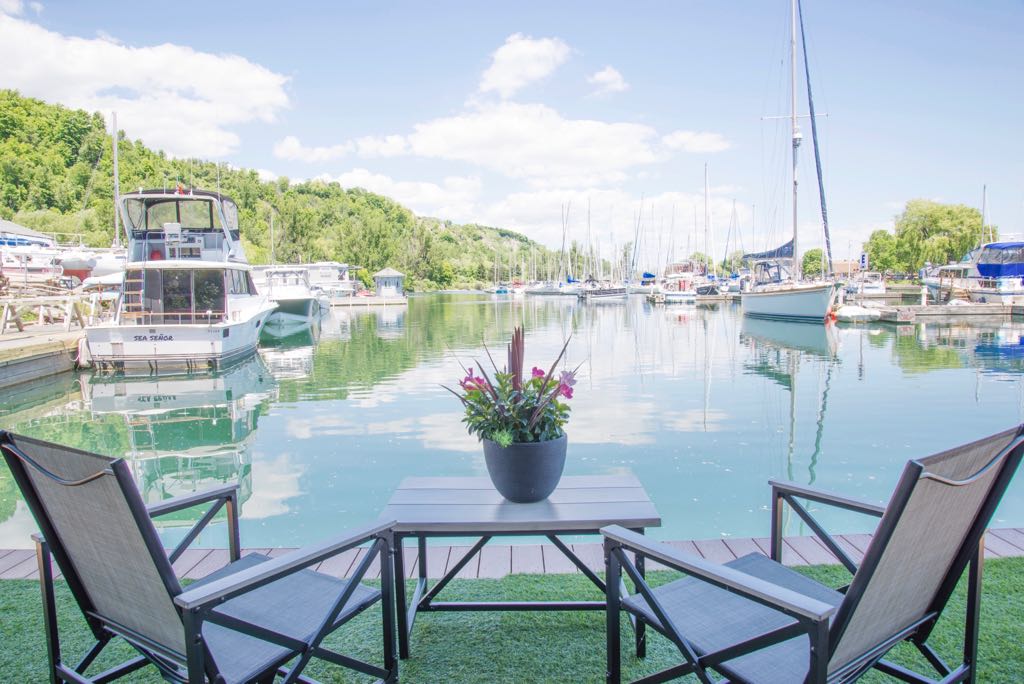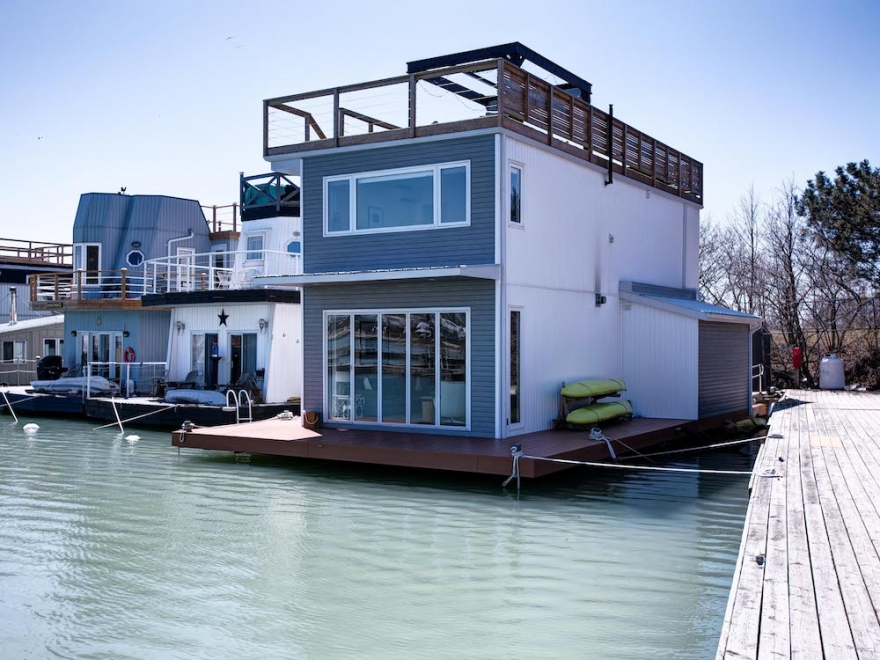During the pandemic, people have looked far and away for new places to live, moving to the ‘burbs, small towns or country or cottage properties for more space and a different place to call home.
But a lucky few have stumbled upon a house close to downtown Toronto, with a parklike setting, great views and next to no land. It’s an enclave of vessels that gives new meaning to “living on the water”.
Twenty-five floating homes and about a dozen houseboats (non interchangeable terms for two different types of vessels) are moored at Bluffers Park Marina at the foot of the Scarborough Bluffs.
Floating houses, the larger, more impressive of the two types of vessels, are on floating concrete barges. A misconception about a floating home is that the wood foundation is going to rot because it’s in the water, but it isn’t in the water, it’s on a concrete base, says real estate agent Denise Doucet. She has been selling float homes for 10 years and is one of the 200 residents in this Toronto community.
Houseboats (generally narrower and smaller, and around 400 square feet) are on aluminium or steel pontoons. In the winter, houseboats must have bubblers so the surrounding water doesn’t freeze and damage the pontoons. Some but not all houseboats have a motor and are self propelled.
The floating houses (about 1,600 square feet), are like homes on the water. These particular vessels, some of the only floating houses in the province (floating houses are more popular and plentiful in B.C.) were built about 20 years ago and moved to Bluffer’s Park Marina. About 80 per cent of the floating homes have since been renovated.
Doucet said at that time, the city and neighbours decided there would only 25 floating houses moored there, which makes it extra special. The row of floating houses enjoys great views.
The marina lifestyle is like no other and attracts people from all walks of life. Pre-pandemic, the demographic was 50 plus but now, she says, it’s “24-plus younger guys” discovering the value of the cottage-like lifestyle in the city.
 An interior view of one of the homes.
An interior view of one of the homes.
The most daunting thing about purchasing a floating house or houseboat here is the all-cash requirement. No mortgages are available in this community because the banks don’t want to become involved when there are so few sales per year, Doucet says.
The typical buyer will take the capital out of their existing home, invest some and use the rest to buy a floating house or houseboat with cash.
Floating houses follow the prices for properties at the “top of the hill”, she says. A two-bedroom, 1.5-bathroom vessel is currently listed for $859,000, while a three-bedroom, two-bathroom floating house is listed for $965,000. A houseboat can be purchased for about $350,000 “for now”, says Doucet, who created a website about living in the community.
Mooring fees (less than $850/month) include city water, parking, garbage, additional laundry and shower facilities at the marina, electrical connection on the dock and pump-out equipment to clean out the septic tank (for those who don’t want to do it themselves, marina staff can be hired).
Other costs include taxes (about $800/year for floating houses – houseboats do not pay taxes) and insurance, which she says costs between $400 and $800 per year.
The best part of living there is the boating community, which in non-pandemic times gathers regularly. You are not alone unless you want to be, Doucet says.
The social aspect has continued during the pandemic, with residents being six feet away from each other while on their own docks or decks.

The majority of owners live in the community year-round but for those who want to use it as a summer home, it’s like a condo – just lock and go, she says.
Doucet says she loves the lifestyle. Everyone knows everyone and many “people on the dock” hire her to sell their vessels.
The number one question, Doucet says, is what winters are like. For some reason, people think floating houses are cold, but they have furnaces like a house, and are year-round living ready. However houseboats usually need to be insulated for winter use.
There’s a winding road down to the marina, which the city maintains because people work there, she says.
She says she answers any questions honestly from potential buyers. After all, she lives in the community and they could end up being her neighbours.
She discovered floating houses after helping her husband’s cousin, who wanted to buy a condo in 2010. Doucet saw a listing at the marina. Unsure of what it was all about, they went to view it. The cousin loved the floating house and bought it.
Doucet says selling a floating home or houseboat is much the same as selling other types of real estate but not all lawyers will deal with these vessel purchases and sales.







